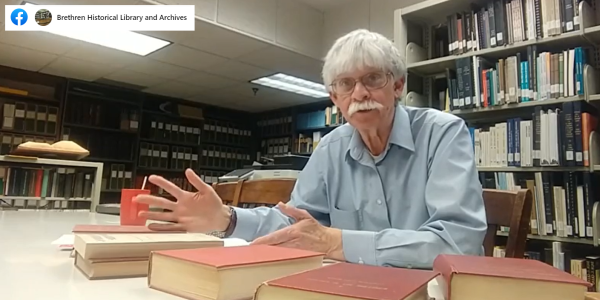
presenting in a recent Facebook live event.
By William Kostlevy, director of the Brethren Historical Library and Archives
In the summer of 1981, I served an eight-week internship at the Brethren Historical Library and Archives (BHLA). As a Bethany Seminary student with a master’s degree in history, it was a natural fit. But little did I realize that it would a life-changing experience that would lead to a career in archives management, new friendships, and an addiction to Brethren history.
On a normal day that summer I would ride from the old Bethany Oak Brook campus with the truly legendary Bob Faus, director of Ministry for the church. While many remember Bob for his wonderful sense of humor (which I enjoyed as much as anyone), I remember his generous mentorship and infectious love for the complex and diverse Church of the Brethren. In truth, I learned more about the Church of the Brethren from Bob’s marvelous stories than I learned from any class I took at Bethany.
My primary work that summer was processing the many smaller archival collections that had accumulated over the years. Many were collections documenting the work of the Church of the Brethren in Illinois and included papers of Illinois pastor and Bethany faculty member J. W. Lear and his equally accomplished wife, an ordained minister named Martha Lear; Brethren educator C. Ernest Davis; the Civil War era diaries of John Emmert; and the many small collections of Illinois congregations. To this day the names Cerro Gordo, Lanark, and Polo conjure up images of ordinary rural Brethren serving and transforming their communities in unexpected ways. I met many remarkable volunteers that summer including former Messenger editor Kenneth Morse; founder of the Fellowship of Brethren Genealogists, Gwen Bobb; and the very interesting Edith Barnes whose memories of the church and Elgin dated from the arrival of her father to head the Mission Board in the 1920s.
My summer in the archives opened unexpected doors to work in the archives of the University of Notre Dame, a rare PEW Charitable Trust funded opportunity to create a comprehensive list of manuscript collections documenting the Wesleyan Holiness tradition at Asbury Theological Seminary, and archivist positions at Asbury Theological Seminary and Fuller Theological Seminary. All of these culminated in me returning as the director of the BHLA in 2013.
As director of the BHLA, I have sought to continue the work of my predecessors Jim Lynch, Ken Shaffer, and Terry Barkley. Our primary task is to preserve the heritage of the Church of the Brethren and make documentation of that heritage available. In this role, I have experienced the truly worldwide significance of Brethren witness with visitors and outside researchers from India, Nigeria, Sweden, Belgium, Spain, Korea, and especially China, using BHLA materials to tell the story Brethren service and mission in their respective countries. Working with gifted interns Keith Morphew, Andrew Pankratz, Kelley Brenneman, Aaron Neff, Fred Miller, Haley Steinhilber, Maddie McKeever, Zoe Zorndran and Allison Snyder, I have attempted to highlight the uplifting stories of the largely unknown figures who witnessed to and lived the gospel of Jesus Christ in unforgettable ways in Europe, North America, and around the world.
In May of 2013, I had the opportunity to spend a day with Dale and Lois Brown acquiring one of the most important manuscript collections documenting the Brethren story in the second half of the twentieth century and, more personally, the papers of a friend and mentor. Equally important were trips acquiring the papers of Warren Groff, Donald E. Miller, and later Gene Roop, another favorite and important personal mentor. Other adventures included a trip to Santa Barbara, Calif., to interview the noted actor Don Murray who raved about his experiences as a conscientious objector, completing alternative service with the Church of the Brethren in Europe. I especially enjoyed interviewing Esther Frye, member of Mount Morris (Ill.) Church of the Brethren, who clearly recalled an afternoon spent at the home of Bethany Theological Seminary co-founder at E. B. Hoff, ninety years earlier.
I will never forget the Chinese visitors whose enthusiasm for the work of Brethren missionaries in Shanxi Province reminded me that the Brethren story is truly a story that is not limited to North America. But closer to Elgin, I think of the truly extraordinary courage of Harold Row in offering Nathan Leopold, one of the most notorious figures of the last century, a chance to serve humanity outside a prison wall. Or the Indiana farmers who sought to end war and hunger by providing livestock to those in need. Or Anna Mow sharing the old Pietist dream of the possibility for all of us to have a new meaningful life in the power of the Holy Spirit.
In the end I am truly grateful to the Church of the Brethren for the priority and support given to the BHLA, and for giving me the privilege of having the job of a lifetime. Thank you for supporting the life-changing work of the Church of the Brethren and helping preserve our remarkable and rich history.
Learn more about the Brethren Historical Library and Archives at www.brethren.org/bhla, or support this Core Ministry of the Church of the Brethren at www.brethren.org/giveBHLA.

